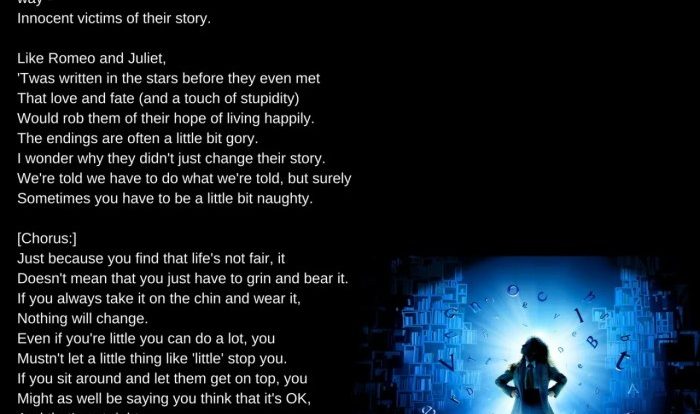Fiddler on the roof lottery – Welcome to the captivating world of “Fiddler on the Roof” lottery, a timeless tale that explores the intersection of tradition, hope, and the indomitable spirit of a community. Set against the backdrop of Anatevka, Russia, in the early 20th century, this beloved musical delves into the lives of the Jewish villagers as they navigate the challenges of a rapidly changing world.
The lottery scene in “Fiddler on the Roof” stands as a pivotal moment, reflecting the villagers’ hopes for a better future and their unwavering faith in the power of tradition. Tevye’s decision to participate in the lottery symbolizes his willingness to embrace both the possibilities and the uncertainties that lie ahead.
Historical Context of “Fiddler on the Roof”
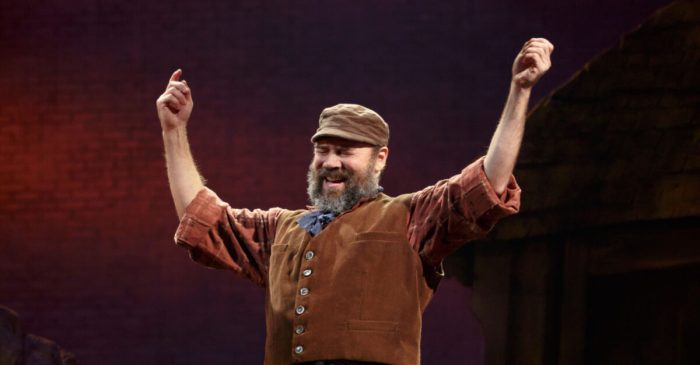
Set in the early 20th century, “Fiddler on the Roof” depicts the lives of a Jewish community in the fictional village of Anatevka, Russia. During this period, the Jewish community faced increasing persecution and discrimination under the oppressive regime of the Russian Empire.
Jewish Community in Anatevka, Fiddler on the roof lottery
The Jewish community in Anatevka is deeply rooted in tradition and religious observance. They live in a close-knit and insular community, adhering to the customs and laws of their faith. However, their lives are constantly overshadowed by the threat of pogroms and forced displacement.
The Fiddler on the Roof lottery is a great way to win some extra cash, and it’s also a fun way to learn about Chamorro culture. Happy New Year in Chamorro is “¡Håfa Adai!” and is celebrated with feasts and fireworks.
The Fiddler on the Roof lottery is a great way to celebrate the new year and win some money at the same time.
Themes Explored
The musical explores several key themes, including:
- Tradition:The importance of tradition and the challenges of maintaining it in a changing world.
- Family:The central role of family in Jewish culture and the bonds that unite generations.
- Identity:The struggle to maintain one’s identity amidst external pressures and social change.
The Lottery Scene in “Fiddler on the Roof”
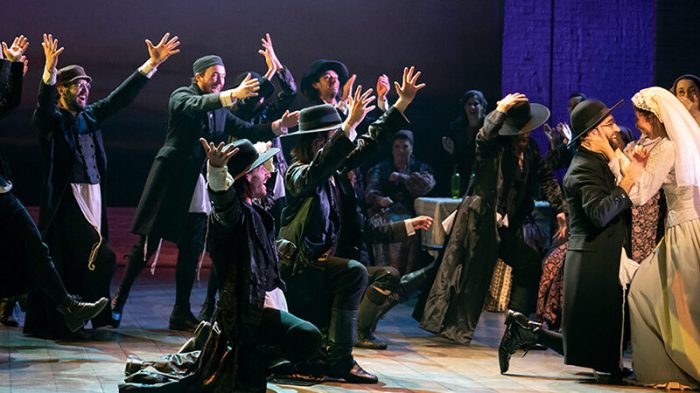
The lottery scene in “Fiddler on the Roof” holds profound significance within the musical’s narrative. It encapsulates the hopes, dreams, and fears of the villagers in the face of uncertainty.
Symbolism of Tevye’s Participation
Tevye’s decision to participate in the lottery is a symbolic act that underscores the villagers’ desperation and longing for a better life. Despite the odds being heavily stacked against them, they cling to the hope that a miracle might occur.
Tevye’s participation represents the collective faith and aspiration of the community, even in the face of overwhelming adversity.
Reflection of Villagers’ Hopes and Dreams
The lottery serves as a tangible manifestation of the villagers’ aspirations for a brighter future. The prospect of winning the grand prize ignites their imaginations, offering a glimmer of escape from their impoverished and oppressive existence. It represents their yearning for a life free from hardship and uncertainty.
Reflection of Villagers’ Fears
The lottery also exposes the villagers’ underlying fears and anxieties. The randomness and unpredictability of the draw mirrors the precariousness of their own lives. They are constantly at the mercy of fate, with little control over their destiny. The lottery becomes a symbol of the unknown and the potential for disappointment and heartbreak.
The Role of Tradition in “Fiddler on the Roof”: Fiddler On The Roof Lottery
In the small Jewish village of Anatevka, tradition holds a profound and unwavering grip on the lives of its inhabitants. It governs every aspect of their existence, from the moment they are born to the day they die. Marriage, work, and relationships are all dictated by the centuries-old customs and beliefs of the community.
Marriage and Family
Tradition plays a particularly significant role in the realm of marriage and family. Marriages are arranged by the matchmaker, Yente, who ensures that each couple is well-suited to each other in terms of social status and financial means. Love is considered a secondary factor, and it is expected that couples will grow to love each other after they are married.
Family is also of paramount importance in Anatevka. Children are expected to obey their parents without question, and they are taught to respect their elders. The extended family provides a strong support network, and it is considered a disgrace to bring shame upon one’s family.
Work and Careers
Tradition also dictates the career paths of the villagers. Most men are farmers or tradesmen, while women are expected to stay at home and care for the children. There is little opportunity for social mobility, and it is generally expected that people will follow in the footsteps of their parents.
Challenges to Tradition
While tradition is deeply ingrained in the Jewish community of Anatevka, it is not without its challenges. As the world outside begins to change, so too do the attitudes of some of the villagers. Tevye, the protagonist of the musical, begins to question some of the traditional practices, such as the arranged marriage of his daughters.
These challenges to tradition create conflict within the community. Some villagers cling fiercely to the old ways, while others embrace the new ideas. This conflict ultimately leads to a crisis of faith for Tevye, who must decide whether to remain loyal to his traditions or to follow his own heart.
The Characters in “Fiddler on the Roof”
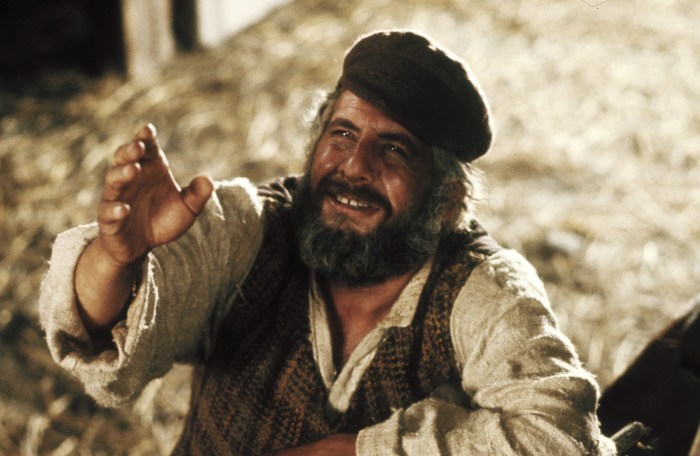
The characters in “Fiddler on the Roof” are a diverse and complex group, each with their own motivations and conflicts. They represent the different generations and perspectives within the Jewish community of Anatevka, and their interactions with each other help to create the rich tapestry of the story.
Main Characters
The main characters of “Fiddler on the Roof” are:
| Name | Relationship | Description |
|---|---|---|
| Tevye | Dairyman and father of five daughters | A devout Jew who is struggling to maintain his traditions in a changing world. |
| Golde | Tevye’s wife | A strong and practical woman who is fiercely loyal to her family. |
| Tzeitel | Tevye and Golde’s eldest daughter | A kind and gentle young woman who is eager to find love. |
| Hodel | Tevye and Golde’s second daughter | A strong-willed and independent young woman who is determined to make her own choices. |
| Chava | Tevye and Golde’s third daughter | A quiet and introspective young woman who is drawn to spirituality. |
| Shprintze | Tevye and Golde’s fourth daughter | A lively and mischievous young woman who is always getting into trouble. |
| Bielke | Tevye and Golde’s youngest daughter | A sweet and innocent young woman who is still a child at heart. |
These characters are all connected to each other in complex ways, and their relationships are constantly evolving throughout the play. Their interactions with each other help to create the rich tapestry of the story, and they each play a vital role in the overall narrative.
Motivations and Conflicts
Each of the main characters in “Fiddler on the Roof” has their own unique motivations and conflicts. Tevye is struggling to maintain his traditions in a changing world, while Golde is fiercely loyal to her family. Tzeitel is eager to find love, while Hodel is determined to make her own choices.
Chava is drawn to spirituality, while Shprintze is always getting into trouble. Bielke is still a child at heart, but she is also growing up and learning about the world around her.
These motivations and conflicts create tension and drama throughout the play. They force the characters to make difficult choices and to confront their own beliefs and values. Ultimately, they help to create a rich and complex story that explores the human condition.
The Themes of “Fiddler on the Roof”
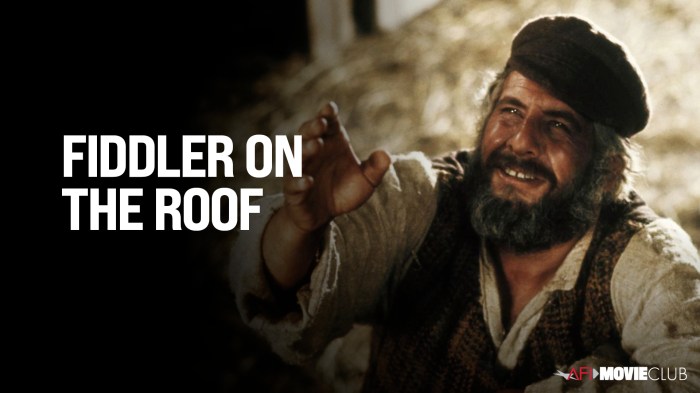
“Fiddler on the Roof” explores various enduring and profound themes that resonate deeply with audiences across generations and cultures. These themes are woven into the narrative through the characters’ experiences, interactions, and the evolving social and historical context of the story.One
of the central themes is the tension between tradition and modernity. The musical portrays the struggle of Tevye, a devout Jewish dairyman, to uphold his traditional values and beliefs amidst the encroaching forces of modernization. As the outside world brings new ideas and influences, Tevye grapples with the challenge of preserving his cultural heritage while adapting to the changing times.Another
prominent theme is the importance of family and community. The musical depicts the close-knit bonds within Tevye’s family and the broader Jewish community. Through their interactions, the characters highlight the strength and resilience of family ties, the value of mutual support, and the challenges of navigating generational differences within a changing society.Furthermore,
“Fiddler on the Roof” explores the themes of love and marriage. The musical portrays the complex dynamics of arranged marriages, the search for true love, and the challenges of balancing personal desires with societal expectations. Through the characters’ experiences, the musical examines the nature of love, the sacrifices it requires, and the enduring power of human connection.The
themes explored in “Fiddler on the Roof” remain relevant and universal to audiences today. The tension between tradition and modernity continues to shape societies worldwide, and the importance of family, community, love, and marriage remains central to human experience. The musical’s exploration of these themes provides a timeless and insightful commentary on the human condition, offering valuable lessons and perspectives that resonate with audiences across cultures and generations.
FAQ Explained
What is the significance of the lottery in “Fiddler on the Roof”?
The lottery represents the villagers’ hopes for a better future and their faith in tradition.
How does Tevye’s decision to participate in the lottery reflect his character?
Tevye’s decision shows his willingness to embrace both the possibilities and uncertainties of life.
What are the main themes explored in “Fiddler on the Roof”?
The musical explores themes of tradition, family, identity, hope, and dreams.
